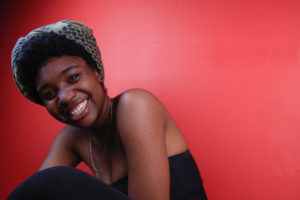
In just an hour long chat with Qualia ‘Akili’ Holder-Cozart, we shared laughter and tears as we talked haircuts, hustle and humility in today’s environment. She’s for real, y’all. And theres some pretty cool links in here too.
How long have you worked with Theater Delta?
I came to Theater Delta in 2018, so it’s been a couple years now.
What roles have you played with us?
I’ve played two roles with TD. The one I play the most is Becca (the bystander role) in “How ‘bout This Party.” I still remember my first time on this gig – it was great, I worked with Ren Cleveland, Amadio (he was my bae) and Ford Nelson — man I remember Ford’s character took a beating from the audience – it was good, it was what we needed in that space – talking about rape culture and consent – it was hard on him, but we all learned a lot from it.
The other role I’ve played was for a North Carolina Medicaid conference in Chapel Hill that was about healthcare workers moving patients out of assisted care homes. I got to work with Thaddaeus Edwards – I was his daughter. My character was struggling with trying to be the primary caretaker to a father who wanted to be taken out of the home he was staying in. We touched on topics such of mental health of caretakers, racial profiling within the healthcare system and life issues of the medical professionals as well. He was a great ornery, old dad. I loved working with him – arguing with him was so much fun.
What from your work with Theater Delta has affected you in your real life?
Definitely my role in How ‘bout This Party. Because I am a victim of sexual abuse, being in this scene was a really big deal for me. My first time working on this performance was one of the first groups of people I shared that part of my past with. TD helped me come out about this, helped me grow comfortable and safe in my experience. It meant and means so much to me to be a part of such an impactful piece that really educates people about alcoholism and sexual assault. There are so many different layers of abuse, and being a part of this project time and time again has impacted me so much. I am still so proud of the people that I’ve worked with and encourages me to know that if I could do it, others could be more comfortable sharing their experiences as well. I am now more open, willing and, when it is appropriate, I feel it is important to include that part of my history.
In what ways have you been personally affected by racism?
Ah man, where do I even start… Growing up in a mostly White suburban area, I think for me it was a little odd. My parents were not raised in this same environment and wanted us to be raised in a safer, more secure lifestyle. My family and I are very outspoken, educated, not the “typical Black family” in others’ eyes, so I got discrimination from both sides. Other Black kids would say things like: “She thinks she’s better than us!” or “She thinks because her parents have money…” Whereas my White classmates would bully me, push me around and call me all types of names. Because of my skin tone, a few hours in the sun during recess and PE would make me like three shades darker, so I was constantly called ugly for being so dark, I was picked on for wearing braids and having a funny name. “What kind of weird African name is that?”
The petty, elementary school picking stuck with me as I got older – I started going by nicknames, I became very manipulative and found myself in unhealthy relationships. Through most of my adolescent years, I was in this weird phase of not knowing who I was, nor being comfortable in my own skin.
When I entered into adulthood and started applying to jobs in the music industry, I wouldn’t get callbacks. Or, I would have a great introductory phone call, but upon meeting me in person, I was no longer the nice young lady they talked to on the phone, and I wouldn’t get booked at certain venues. I started seeing racism in the world then outside of just kids being mean. I was so angry and was in poor mental health, I had issues with God, and looking back at being molested in high school, raped in college, all cumulated into the feeling of this “curse” (as I saw it at the time) of being Black.
It really was not until this last year that I was comfortable and proud of my Blackness. I just turned 23, so I’m not very old, but that is a long time to not know yourself or love yourself. It had a massive impact on me, and still to this day, though I am in a much better place, I face tons of insecurity about my race. So you know what I did? I chopped off all my hair.
Woah! Tell me more about that decision.
I went natural, my intention to be strong and show off my Black features, to be proud of myself and my talents despite my self esteem being very low. To fight myself so boldly despite what the world was telling me was wrong with me. Black people are very attached to our hair, our roots. Over the years, I experienced a lot of negativity – and all of that was in my hair, weighing me down. In the past year, I’ve entered into the military, gone through training, started a new relationship, a new job, new opportunity, new environment, I wanted to start fresh – so I chopped it. I feel more spiritually connected than ever, I feel so free, I’m so in love with myself, I feel beautiful. And that physical change brought about other change as well. I started forcing people to say my first name, and taught them to say it correctly.
This Spring when everything went down, I started getting bogged down by my Blackness, all of the racial business, I was very sensitive to my ancestors, Black people around me, I started to doubt myself, my talent, my beauty.
Rather than wondering all the time “What is wrong with me?” I have to keep reminding myself that hate is something that is just in the world. For instance, the debate of Black Lives Matter vs. All Lives Matter: Hate exists in the world for all people, yet right now there is a need to address the hate toward a specific demographic group. Many have experienced it in their own way – you have to learn what it looks like to cope. Over time if you allow yourself to grow in strength, love, understanding of people, and listen to the person beneath that is crying out for help, you will learn how to adapt, maneuvering around the hate that is dealt to you so that you can still be satisfied with the person you are when you go to sleep at night.
How has your time in the military have been affected by alllll the events of 2020?
I was in training when Covid hit. I was stuck at Fort Jackson and could not leave for at least 2 weeks, which turned into my graduation being pushed back. It took me two extra months to come home than originally expected – I missed my family, friends, partner, I just wanted to be home. So many people around me weren’t getting paid. They had kids at home, bills to pay — life doesn’t stop because of a pandemic. My heart went out to them. Then we started to get military briefs about the rioting – questions were swirling around training camp: Are your families safe? What is going on?
I am home now, but because I’m in the National Guard, I am currently waiting for my active duty job to begin, and because of everything, it’s taking a little time. In times of transition, it’s easy to sit back and wait, or even blame Covid as the reasons why you don’t have the things that you need – aka an excuse to do nothing. While this thought is not always invalid, I’ve seen it get taken advantage of, and this mentality causes more problems than solutions. I want to see people GET UP and go try, do SOMETHING to help you keep your head above water – be honest, be candid about your circumstance, and you may get somewhere.
I’ve been reaching out to contacts – focusing on my music, I started a youtube channel, am working on some directing and acting coaching gigs and even putting together an a capella group for a friend’s virtual Christmas party! I’m using my skills, hustling and doing what I can in my free time.
While this year has had its challenges, I’m grateful to have an amazing support system. My car works, I’m not hungry, I have little to nothing to complain about. I am in a good place and I’m trying to contribute when I can. There are huge sacrifices that have to be made with where we are, with what’s going on — I hope that more people take this opportunity to use that hustle mentality – if you dig in there are so many opportunities for advancement — I want to encourage people that this isn’t the end.
How do you cope with these experiences?
I am not a silent person, and with being in the military I must be cautious about my opinions. With ARMY across my chest, I have to be more careful about what I say and how I say it. I’ve been taking my time to process, to respond rather than react.
Writing has been HUGE. My partner and I do music together. There is a beautiful song called “Casket Pretty” by Noname. The song was written a couple years before its time – it is more relevant now than it was then. When I was ready, I rewrote the lyrics and performed a cover of it here. It was cathartic, healing.
I also got to join a friend of mine on his Cluttered Minds podcast. He is also in the National Guard, so we talked about being Black in the military, and I went even further to talk about being an LGBTQ woman in the military.
Using my artistic platforms to cope and strategically communicate how I am feeling definitely helps to express myself, having those palpable skills to lean into keeps me from bottling up all the negativity. It’s always a wonder to be able to talk about things like this – to be open, embrace vulnerability at every angle – it is so important.
What do you wish other people could understand about race in America?
One of the things I want people to understand is that people are not just the color of their skin. And that goes both ways. It is important to address one another beneath what the other person looks like at first glance. We need to communicate to each other with our eyes closed, and discover how people need to be treated. To deal with others based on personality, behavior, etc. and not by the color of our skin. For example, if someone is a good singer, they are going to be a good singer no matter what color they are. If someone is a pain in the butt, they are also going to be a pain in the butt no matter what color they are, haha.
It makes you realize that this race shit is completely made up. The ideas behind racism were created out of a 400 year old institution that should never have been created in the first place. Out of our forefathers and the mistakes that they made. But, if we yearn to see each other for our colors AND what’s beneath, growth and camaraderie are possible.
Our theme for this past week is DONATE – what’s an organization you’d encourage others to donate to during this time?
One of the biggest establishments that I think people should donate to right now is the Durham Artist Relief Fund. They are working hard to support artists of all different backgrounds in our beautiful city due to COVID-19 and I think it’s a wonderful thing that they are doing.
Here is the link: https://www.



















